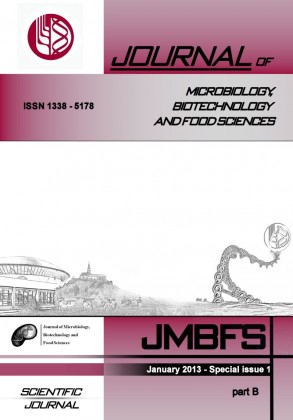ESTIMATION OF UNCERTAINTY AND VALIDATION OF ANALYTICAL PROCEDURES AS A QUALITY CONTROL TOOL THE EVALUATION OF UNCERTAINTY FOR AMINO ACID ANALYSIS WITH ION-EXCHANGE CHROMATOGRAPHY – CASE STUDY
Keywords:
amino acid analysis, combined standard uncertainty, expanded uncertaintyAbstract
The aim of this study was to assess the importance of validation and uncertainty estimation related to the results of amino acid analysis using the ion-exchange chromatography with post-column derivatization technique. The method was validated and the components of standard uncertainty were identified and quantified to recognize the major contributions to uncertainty of analysis. Estimated relative extended uncertainty (k=2, P=95%) varied in range from 9.03% to 12.68%. Quantification of the uncertainty components indicates that the contribution of the calibration concentration uncertainty is the largest and it plays the most important role in the overall uncertainty in amino acid analysis. It is followed by uncertainty of area of chromatographic peaks and weighing procedure of samples. The uncertainty of sample volume and calibration peak area may be negligible. The comparison of CV% with estimated relative uncertainty indicates that interpretation of research results can be misled without uncertainty estimation.Downloads
Download data is not yet available.
Downloads
Published
2013-02-01
How to Cite
Mickowska, B., Sadowska-Rociek, A., & Cieślik, E. (2013). ESTIMATION OF UNCERTAINTY AND VALIDATION OF ANALYTICAL PROCEDURES AS A QUALITY CONTROL TOOL THE EVALUATION OF UNCERTAINTY FOR AMINO ACID ANALYSIS WITH ION-EXCHANGE CHROMATOGRAPHY – CASE STUDY. Journal of Microbiology, Biotechnology and Food Sciences, 2(special issue 1), 1875–1882. Retrieved from https://office2.jmbfs.org/index.php/JMBFS/article/view/7282
Issue
Section
Biotechnology
License
Copyright (c) 2013 Barbara Mickowska, Anna Sadowska-Rociek, Ewa Cieślik

This work is licensed under a Creative Commons Attribution 4.0 International License.
All papers published in the Journal of Microbiology, Biotechnology and Food Sciences are published under a CC-BY licence (CC-BY 4.0). Published materials can be shared (copy and redistribute the material in any medium or format) and adapted (remix, transform, and build upon the material for any purpose, even commercially) with specifying the author(s).

